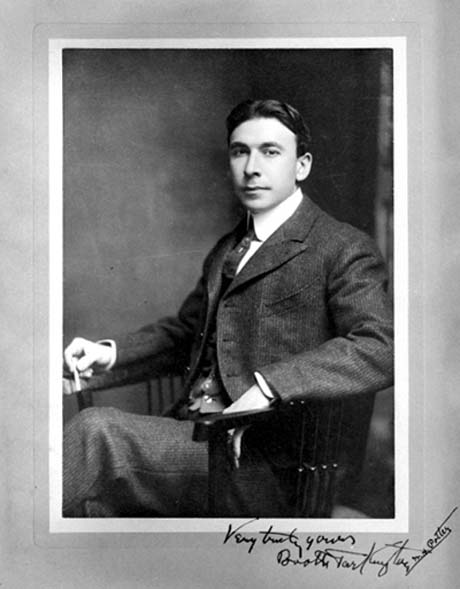<Back to Index>
- Physicist Isidor Isaac Rabi, 1898
- Novelist Booth Tarkington, 1869
- Head of Government of the Kingdom of Italy Benito Amilcare Andrea Mussolini, 1883
PAGE SPONSOR

Booth Tarkington (July 29, 1869 – May 19, 1946) was an American novelist and dramatist best known for his Pulitzer Prize winning novels The Magnificent Ambersons and Alice Adams. He is one of only three novelists (the others being William Faulkner and John Updike) to win the Pulitzer Prize for Fiction more than once.
Booth Tarkington was born Newton Booth Tarkington in Indianapolis, Indiana. He was the son of John S. Tarkington and Elizabeth Booth Tarkington, and named after his maternal uncle Newton Booth, then the governor of California. Tarkington was also related to Chicago Mayor James Hutchinson Woodworth [1848 - 1850]. Tarkington first attended Shortridge High School in Indianapolis, but completed his secondary education at Phillips Exeter Academy, a boarding school on the East Coast. Tarkington attended Purdue University for two years, was a member of the university's Morley Eating Club, and then transferred to Princeton University for another two years, but never officially graduated from either. Booth Tarkington made substantial donations to Purdue for the building of an all-men's residence hall, which the university named Tarkington Hall, in his honor. It also awarded him an honorary degree.
At Princeton, Tarkington was active as a student-actor in what is now known as "The Triangle Club". According to Triangle's official history, Tarkington made his first acting appearance in the club's Shakespearean spoof "Katherine" (this was one of the first three productions in the Club's history that was written and produced by Princeton students, a tradition maintained to the present day). Tarkington returned to the Triangle stage as Cassius in the 1893 production "The Honorable Julius Caesar." Tarkington gained prominence that year at Princeton as a co-author of the play, and as the President of Princeton's Dramatic Association (the name of the club before it was officially changed to "The Triangle Club"). In addition to his membership in and role as founder of The Triangle Club, he was also a member of the Ivy Club, the first of Princeton's historic Eating Clubs. At Princeton he also edited the "Nassau Literary Magazine". Tarkington failed to earn his undergraduate degree, the A.B., due to a single missing course in the classics. Nevertheless, his place within campus society was already determined, as he was voted most popular in the class for 1893. In his adult life, he was asked to return to Princeton on two occasions for the conferral of two honorary degrees, an A.M. in 1899 and a Litt.D. in 1918. The conferral of more than one honorary degree on an alumnus at Princeton University remains a record for the institution. Many aspects of Tarkington's Princeton years prefigured those of the writer F. Scott Fitzgerald who, while an undergraduate nearly 25 years later, also reveled in the literary arts and socialized in the Eating Clubs of Prospect Avenue, but failed to earn his degree as well.
Tarkington was a world traveller who spent much of his later life in Kennebunkport, Maine, and left his papers to Colby College. At the same time, he was also an unabashed Midwestern regionalist, and set much of his fiction in his native Indiana. One of the more popular American novelists of his time, his The Two Vanrevels and Mary's Neck appeared on the annual best-seller lists a total of nine times. The Penrod novels depict a typical upper-middle class American boy of 1910 vintage, revealing a fine, bookish sense of American humor.
Tarkington dramatized several of his novels; some were eventually filmed. In 1928, he published a book of reminiscences, The World Does Move. He illustrated the books of others, including a 1933 reprint of Adventures of Huckleberry Finn, as well as his own. He took a close interest in fine art and collectibles, and was a trustee of the John Herron Art Museum. In 1902, he served in the Indiana House of Representatives, which supplied the experiences for his book In the Arena: Stories of Political Life.
Tarkington was married to Laurel Fletcher from 1902 until their divorce in 1911. Their only child, Laurel, was born in 1906 and died in 1923. He married Susanah Keifer Robinson in 1912. They had no children.
Tarkington began losing his eyesight in the 1920s and was blind in his later years. He continued producing his works by dictating to a secretary. He lived at 4270 North Meridian in Indianapolis from 1923 until his death. He is buried in Crown Hill Cemetery, Marion County, Indianapolis, Indiana.
Much of Tarkington's work consists of satirical and closely observed studies of the American class system and its foibles. He himself came from a patrician family that lost much of its wealth after the Panic of 1873 (after a measure of wealth returned, his mother transferred him to Princeton University to complete his education). Today, he is best known for his novel The Magnificent Ambersons, which Orson Welles filmed in 1942. It is included in the Modern Library's list of top 100 novels. The second volume in Tarkington's Growth trilogy, it contrasted the decline of the "old money" Amberson dynasty against the rise of "new money" industrial tycoons in the years between the American Civil War and World War I.